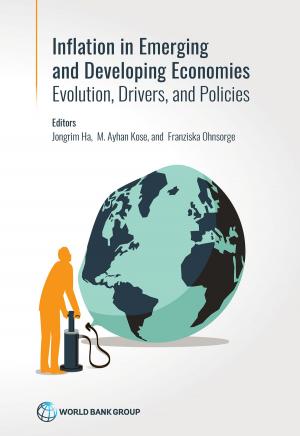Private Health Sector Assessment In Kenya
Nonfiction, Health & Well Being, Medical, Reference, Public Health| Author: | Barnes Jeff; O'Hanlon Barbar; Feeley Frank; Kimberly McKeon; Nelson Gitonga; Caytie Decker | ISBN: | 9780821383599 |
| Publisher: | World Bank | Publication: | June 7, 2010 |
| Imprint: | Language: | English |
| Author: | Barnes Jeff; O'Hanlon Barbar; Feeley Frank; Kimberly McKeon; Nelson Gitonga; Caytie Decker |
| ISBN: | 9780821383599 |
| Publisher: | World Bank |
| Publication: | June 7, 2010 |
| Imprint: | |
| Language: | English |
Kenya's private sector is one of the most developed and dynamic in Sub-Saharan Africa. In the health sector - where the leading causes of death are HIV/AIDS, acute respiratory infection, diarrheal diseases, and malaria - the private commercial (for-profit) sector and the not-for-profit sector play critical roles in preventing and treating disease. Even among the poor, the private sector is an important source of care. For example, 47 percent of the poorest quintile of Kenyans use a private facility when a child is sick. In recognition of this important role, the Government of Kenya (GOK) has developed strategies to develop the private health sector in its Vision 2030 plan as well as in the strategic plans for 2008-2012 of the Ministry of Medical Services and Ministry of Public Health and Sanitation. Some of the key features of those plans include social health insurance to increase access to health care, a reduced role for the Ministry of Health in service delivery, more delegation of authority to provincial and district level, and promoting more public-private partnerships (PPPs).In this context, USAID/Kenya requested that the Private Sector Partnerships-One project (PSP-One) conduct an assessment of the private health sector in Kenya. The scope of work involved assessing the role of the private sector in the overall health system, considering the potential of the private sector to play a greater role and identifying ways to improve the public-private interface to increase equity, access and efficiency in the health system. The development of the scope of work also coincided with the start-up of the World Bank/International Finance Corporation (IFC) program for Better Health in Africa, which envisions improvement of the government-private sector interface to create new opportunities for investment and lending for growth of the private health sector in Africa. As a result, the PSP-One team was able to benefit from World Bank/IFC support for both this report and a summary report that served as a catalyst for a policy dialogue. The recommendations in this report have been revised in consideration of stakeholder feedback received during the policy process.
Kenya's private sector is one of the most developed and dynamic in Sub-Saharan Africa. In the health sector - where the leading causes of death are HIV/AIDS, acute respiratory infection, diarrheal diseases, and malaria - the private commercial (for-profit) sector and the not-for-profit sector play critical roles in preventing and treating disease. Even among the poor, the private sector is an important source of care. For example, 47 percent of the poorest quintile of Kenyans use a private facility when a child is sick. In recognition of this important role, the Government of Kenya (GOK) has developed strategies to develop the private health sector in its Vision 2030 plan as well as in the strategic plans for 2008-2012 of the Ministry of Medical Services and Ministry of Public Health and Sanitation. Some of the key features of those plans include social health insurance to increase access to health care, a reduced role for the Ministry of Health in service delivery, more delegation of authority to provincial and district level, and promoting more public-private partnerships (PPPs).In this context, USAID/Kenya requested that the Private Sector Partnerships-One project (PSP-One) conduct an assessment of the private health sector in Kenya. The scope of work involved assessing the role of the private sector in the overall health system, considering the potential of the private sector to play a greater role and identifying ways to improve the public-private interface to increase equity, access and efficiency in the health system. The development of the scope of work also coincided with the start-up of the World Bank/International Finance Corporation (IFC) program for Better Health in Africa, which envisions improvement of the government-private sector interface to create new opportunities for investment and lending for growth of the private health sector in Africa. As a result, the PSP-One team was able to benefit from World Bank/IFC support for both this report and a summary report that served as a catalyst for a policy dialogue. The recommendations in this report have been revised in consideration of stakeholder feedback received during the policy process.















